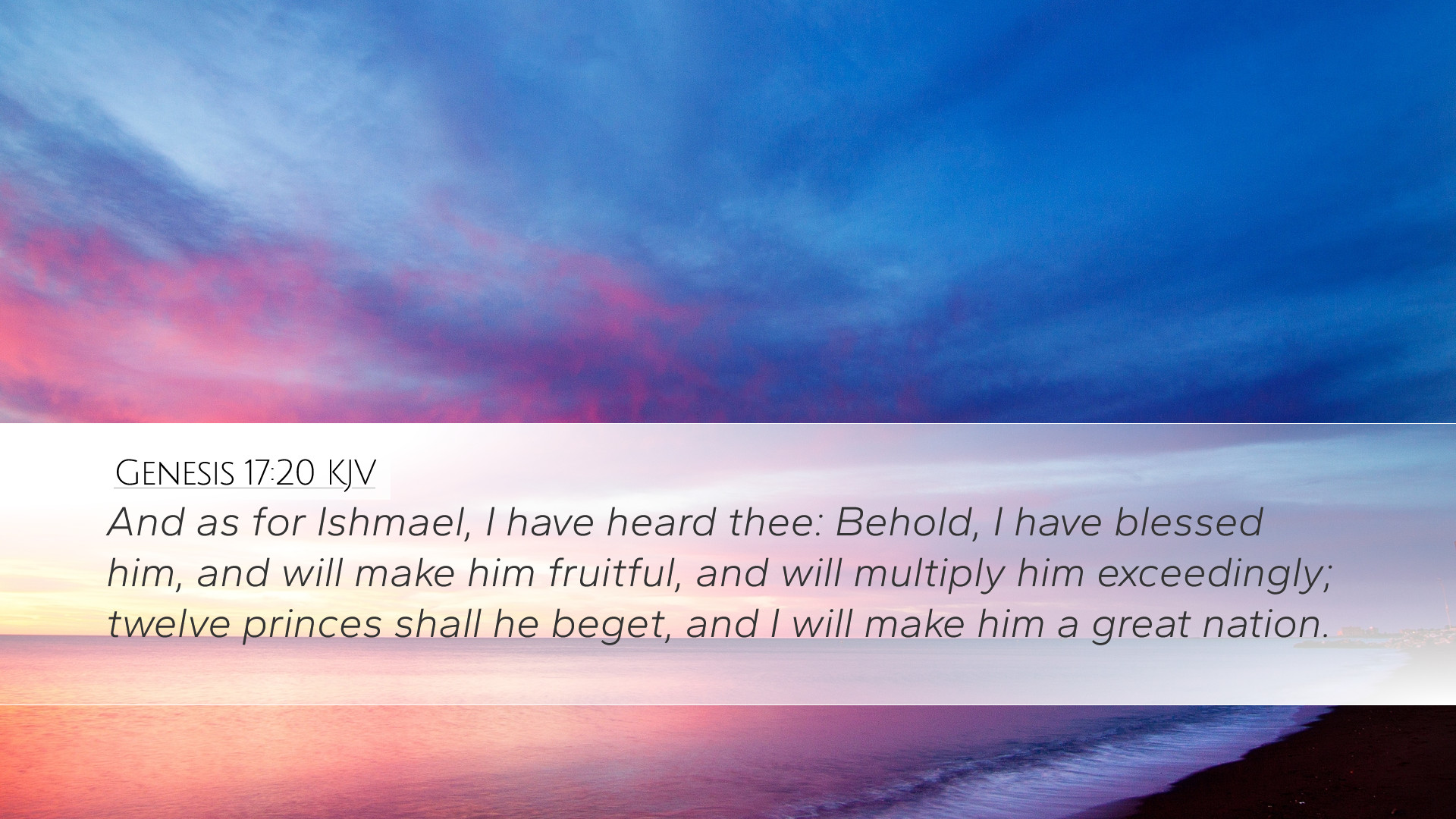Commentary on Genesis 17:20
Verse Text: "And as for Ishmael, I have heard you; behold, I have blessed him and will make him fruitful and multiply him exceedingly. He shall be the father of twelve princes, and I will make him a great nation."
Introduction
Genesis 17:20 is a significant verse that speaks to God's grace, the themes of covenant, and the fulfillment of divine promises not only to Abraham and his descendants but also to Ishmael, the son of Hagar. This commentary synthesizes insights from various public domain commentaries to provide a comprehensive understanding of this verse for pastors, students, theologians, and Bible scholars.
Contextual Background
The context of Genesis 17 is pivotal in understanding the significance of God's covenant with Abraham. This chapter is part of the larger narrative that outlines God's promises to Abraham, establishing the covenant community. God renames Abram to Abraham, meaning "father of many nations," which serves as a precursor to the promise of Isaac. Ishmael's mention here indicates the inclusion of all individuals under God's purview.
Insights from Matthew Henry
Matthew Henry in his commentary emphasizes the mercy and grace of God in His dealings with Ishmael. He points out that while Ishmael was not the child of the promise (as Isaac was), God still hears Abraham's pleas for him. Henry notes that Ishmael's future as a "great nation" illustrates God’s providential care, highlighting the idea that divine promise extends beyond the boundaries of the covenant people.
Insights from Albert Barnes
Albert Barnes provides a detailed analysis of the implications of God's promise regarding Ishmael. He notes that God's willingness to bless Ishmael, despite being the son born out of human impatience and error (in the context of Sarah's inability to conceive), showcases the depth of God’s compassion. Barnes emphasizes that the promise of twelve princes signifies that Ishmael would become a significant figure, suggesting a legacy that parallels the nation arising from Isaac.
Insights from Adam Clarke
Adam Clarke offers a linguistic and cultural examination of the term “great nation.” He argues that God's declaration about Ishmael not only promises numerical increase but also recognizes the influence and importance of the descendants of Ishmael in historical context. Clarke posits that this prophetic statement has seen fulfillment throughout history with the emergence of Arab nations, giving a historical grounding to the promise made to Ishmael.
Theological Implications
This verse raises important theological considerations regarding divine election and inclusion. Ishmael, often viewed as an outsider to the covenant, is acknowledged and blessed by God. This can serve as a reminder of God's impartiality and His outreach beyond the immediate boundaries of His chosen people. It challenges theologians to consider how God's plan of redemption encompasses a broader scope than typical interpretations might suggest.
Covenantal Theology
The covenant that God establishes with Abraham is indeed central, yet Genesis 17:20 illustrates that God's covenantal promises are not limited. Paul’s writings in the New Testament often reflect on the nature of God’s promise and the inclusion of Gentiles, which can be seen as an extension of the inclusivity echoed in this verse.
The Nature of God’s Blessing
God's statement “I have blessed him” speaks volumes about His nature. It reflects the idea that divine blessing is a multifaceted theme, encompassing both spiritual and material dimensions. The blessings pronounced over Ishmael highlight the multifaceted nature of God’s grace that does not isolate or exclude based on human decisions or circumstances.
Application for Today’s Believers
For contemporary readers and believers, Genesis 17:20 can provide a source of encouragement about God’s faithfulness in seemingly adverse circumstances. It assures that God hears prayers for those who may seem marginalized or overlooked. This verse can invite believers to broaden their understanding of God’s grace, encouraging outreach and compassion in the context of community and relationships.
Imparting Hope
For pastors, this passage can be a powerful sermon illustration demonstrating the hope found in divine blessings, urging congregations to seek God's direction in their lives and those around them. It illustrates that every individual plays a role in God’s overarching plan, regardless of their background.
Conclusion
Genesis 17:20 encapsulates a rich tapestry of divine promise, inclusion, and the expansive nature of God’s grace. Insights from Matthew Henry, Albert Barnes, and Adam Clarke reveal layers of meaning inherent in this verse, presenting a duality of God’s faithfulness to His covenant while also highlighting His mercy towards all of humanity. As such, it stands as a reminder for scholars and practitioners alike to engage with the complexity of God's narrative throughout the scripture.


